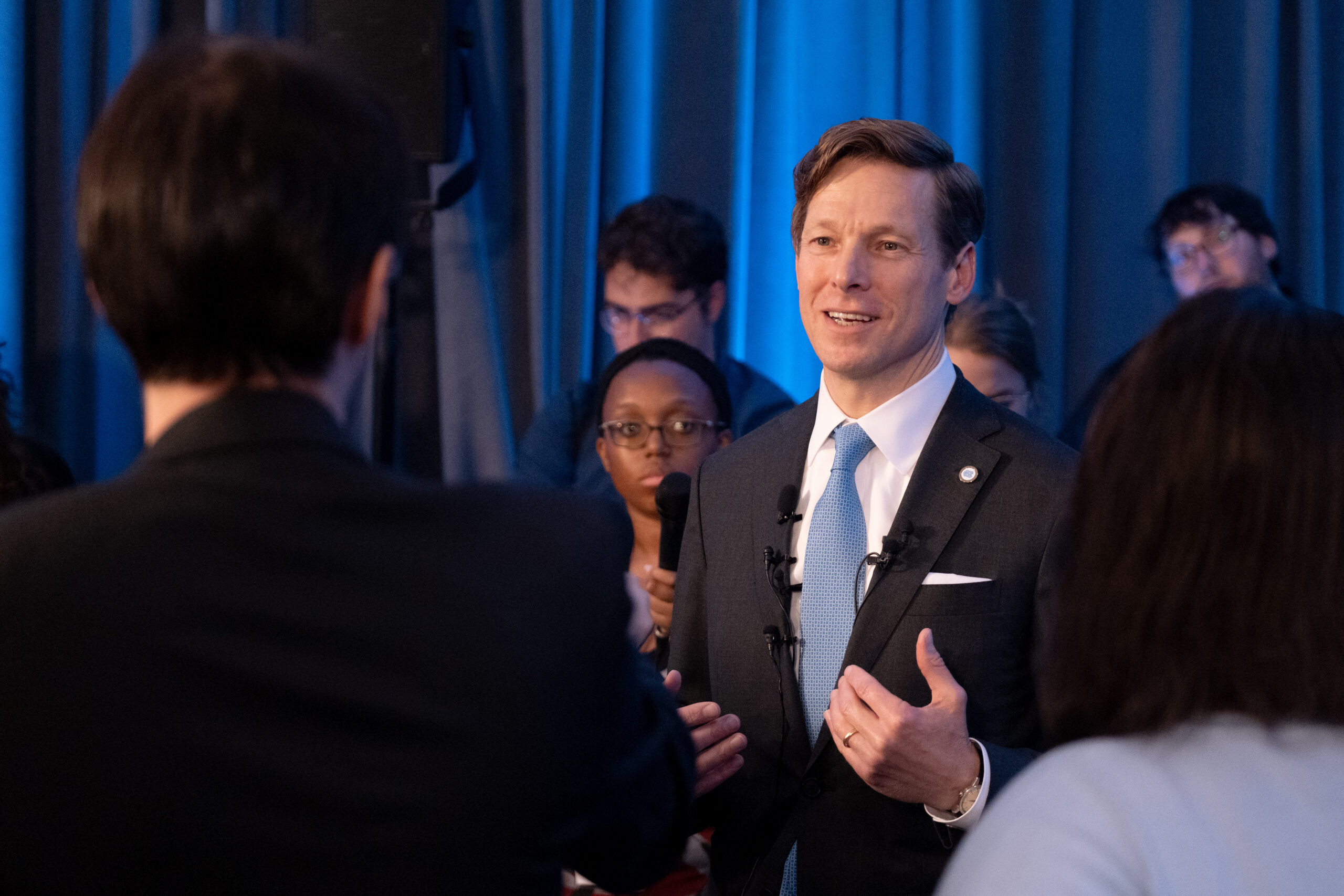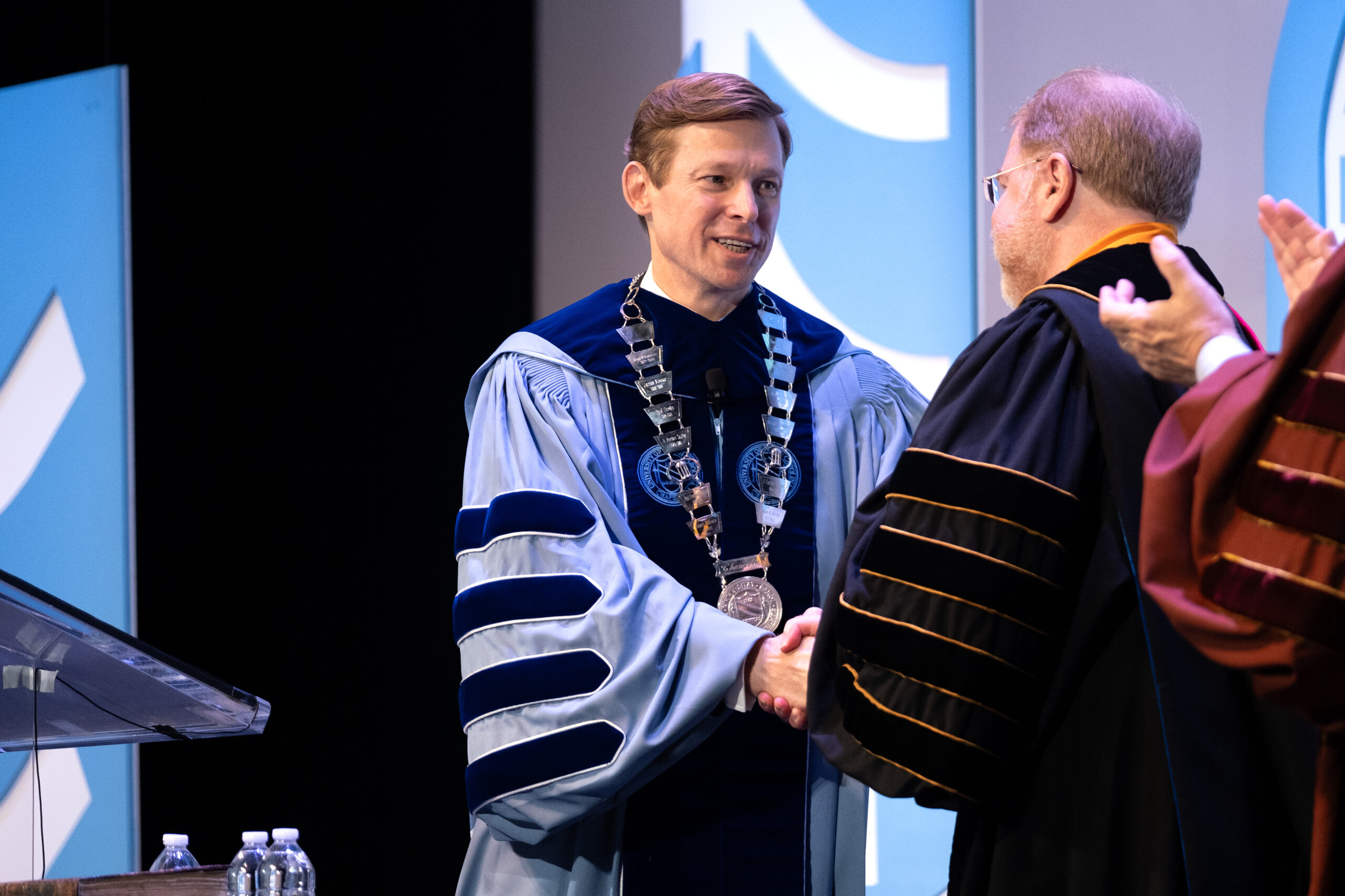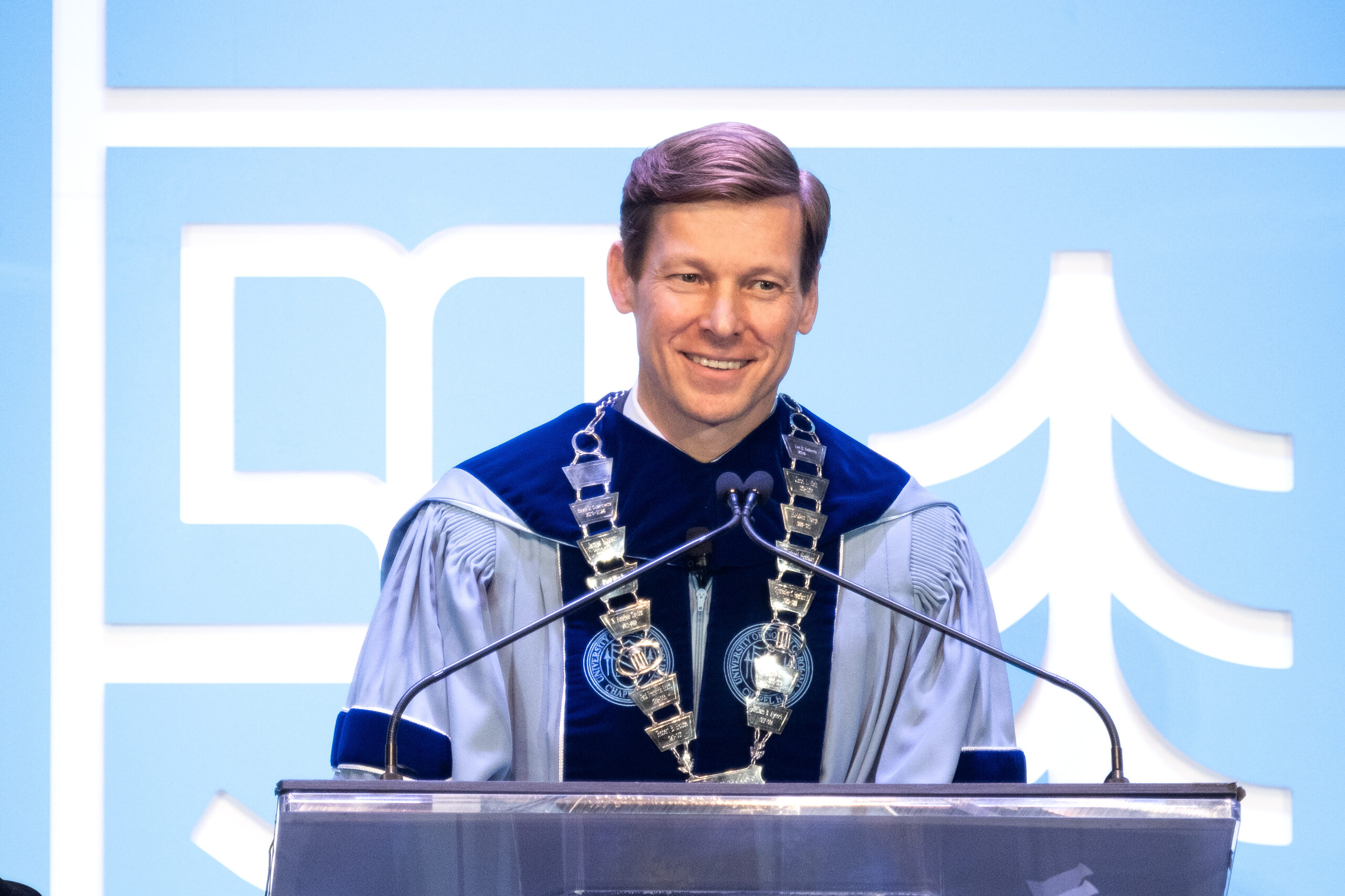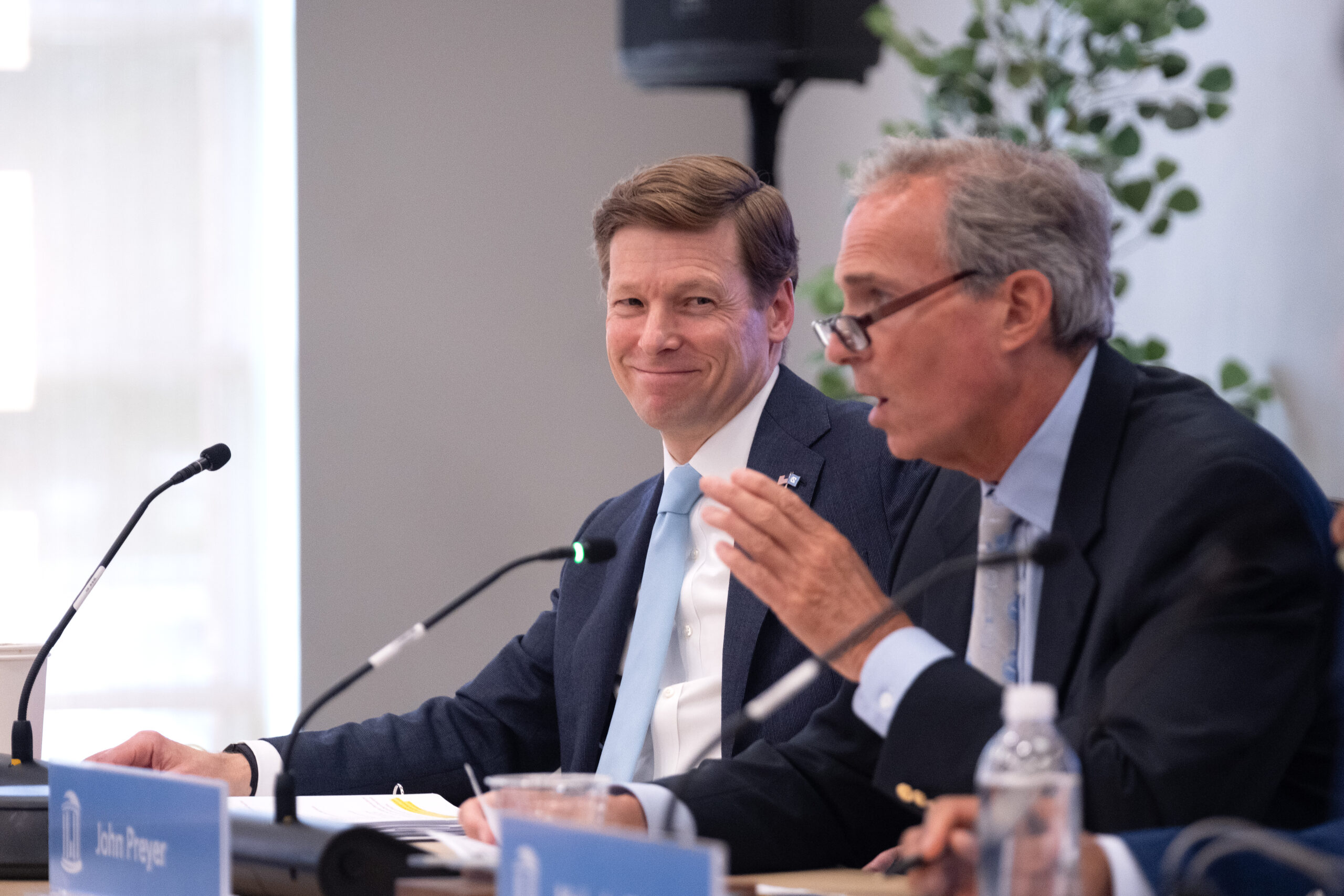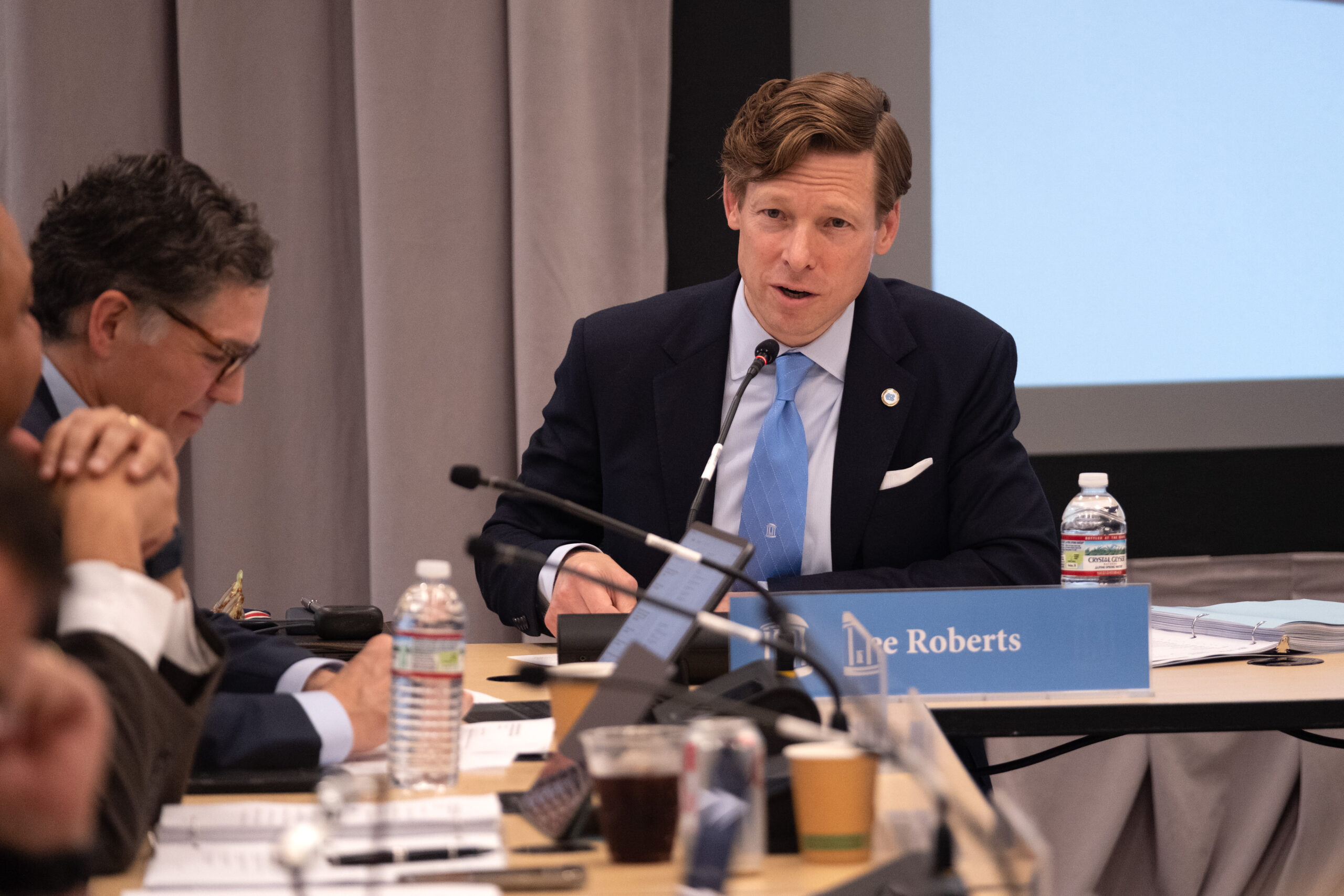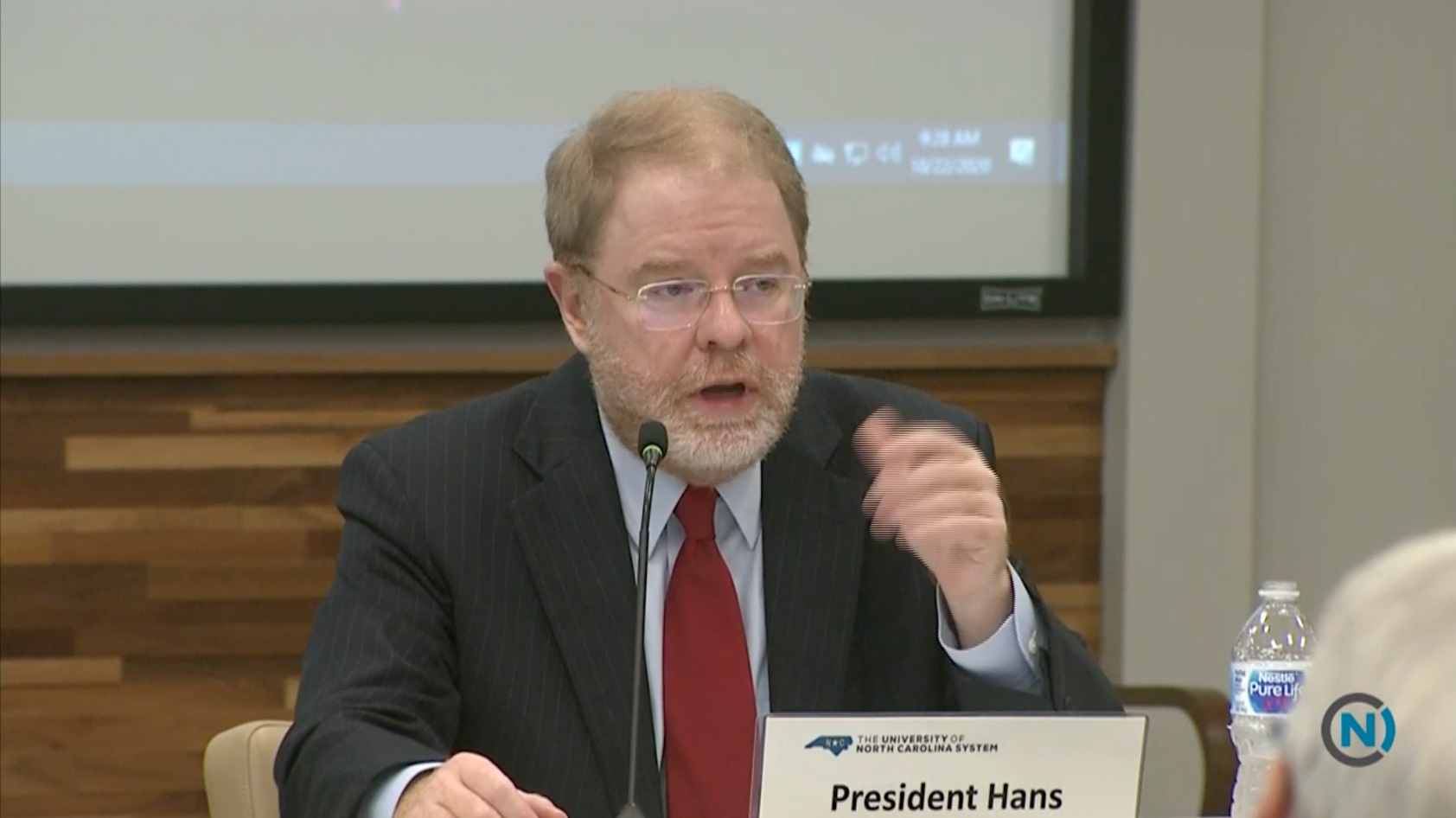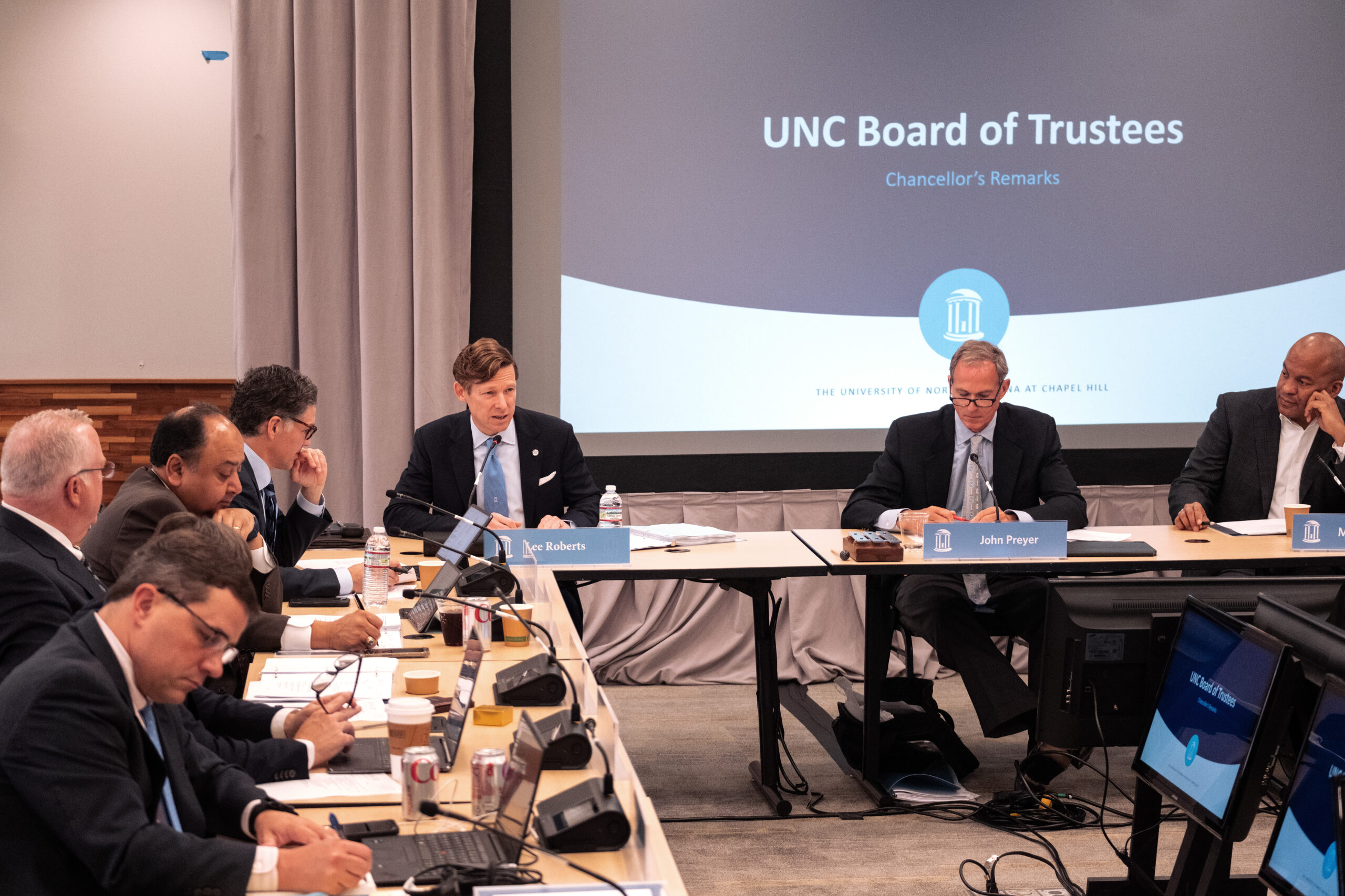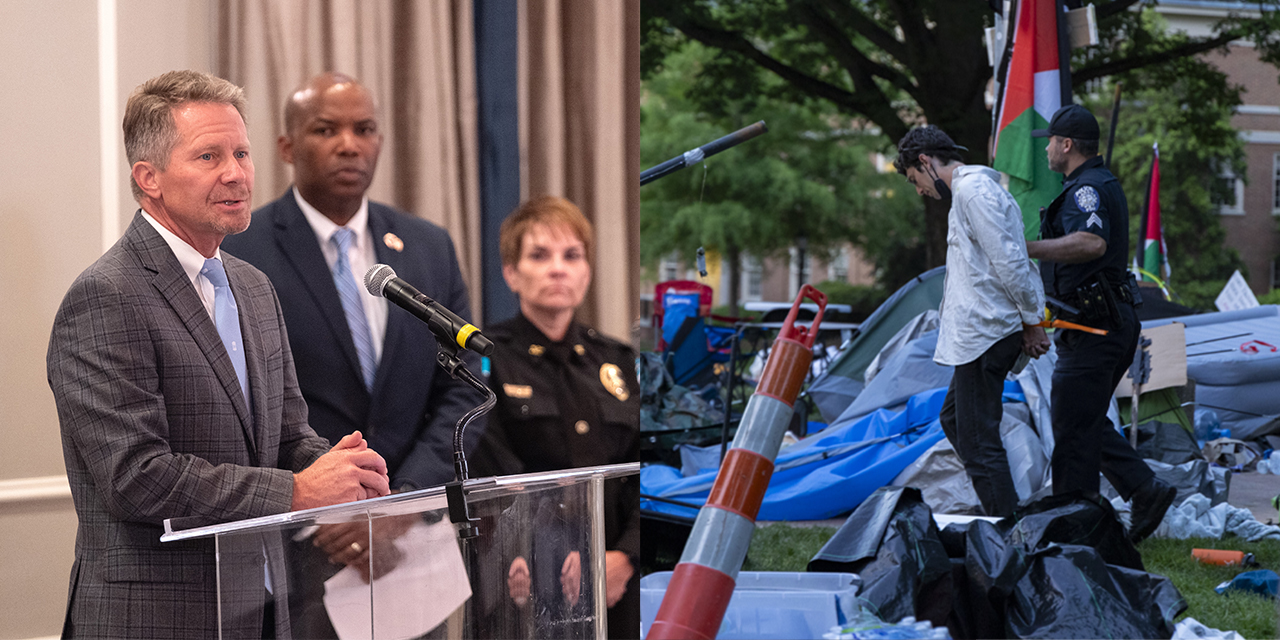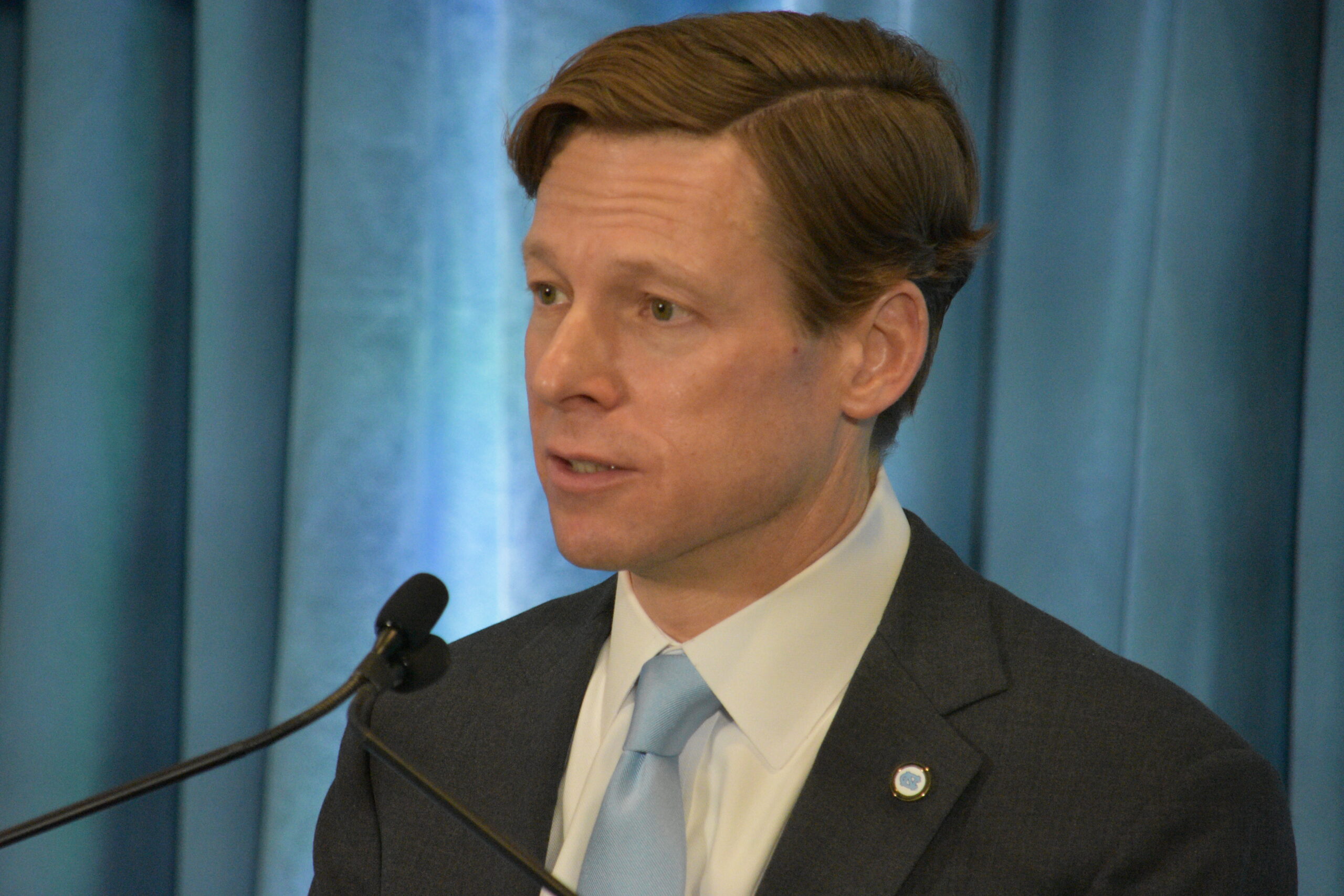Having already been in charge as interim chancellor for several months, Lee Roberts’ introductory press conference as UNC’s permanent chancellor on Friday held a little less fanfare than perhaps typical for such a transition. But the event let media and the campus community gain further insight into Roberts’ vision for the university and thoughts on current events with the context of being the Chapel Hill university’s long-term leader.
After earning the nomination from UNC System President Peter Hans and vote of approval from the Board of Governors, Roberts spoke with gathered reporters to answer several questions. Below are highlights of some of the topics asked about and the new chancellor’s responses — which have been lightly edited for clarity where necessary and are presented in a different order than asked and answered.
The full audio of the press conference can be listened to here.
On President Hans’ comments about leading UNC not being “for the faint of heart” and facing criticism:
I’m going to try to approach the job the same way I have over the last eight months, which is: meet as many people as possible, listen as much as I possibly can, try to make sure that I’m hearing all points of view. There’s always going to be a range of opinions here. We’re starting our 230th academic year, and I’m pretty confident that over the course of those 230 years, there’s always been disagreement about the direction of the university and the right course of action. The role of the chancellor is to listen to as many views as possible and then make the best decisions he or she can in the best interest of the university.
On the perceptions of being tabbed for the permanent job when chosen as interim chancellor and whether the selection will affect his ability to build relationships on campus:
Nobody promised me anything. The process felt pretty rigorous from my standpoint as a participant. And if you look at the folks who are on the search committee, it’s a long list of pretty credible, well-respected senior leaders across our campus and across our community. I understand there are people who are skeptical, and that’s probably always going to be true. But my job is to continue as much outreach as I possibly can, meet with as many different folks as I can, make sure I’m hearing as many different voices as possible. This is as diverse and as dynamic a community as you can imagine. There’s a multitude of voices, and you’re never going to be able to hear them all. But I think as chancellor you have to do your best to try.
On whether his relationships at the state government level, and support voiced by Republican leaders, played a role in his selection:
I don’t know if it gave me a leg up in the search or not. I assume everybody in the search process had their own set of strengths and different attributes. To the extent that I’ve been in the state for a long time and have relationships from my time as budget director and otherwise: hopefully that is helpful to Carolina and what we’re trying to do here.
On hearing and incorporating student feedback into decision-making in the wake of student demonstrations and clashes with university police in the spring:
Obviously, we want to make sure that we’re taking as much feedback as possible into account. When it comes to the protest activity in particular, we not only support the right of the students to protest, we encourage it. We want our students to be involved, to be passionate, to participate in public dialogue about issues of concern to them and to the broader community. We have some very reasonable, very easy to follow rules when it comes to protest. Please don’t vandalize our historic buildings. You can’t turn the quad into a private campground. And please don’t threaten, harass or intimidate students, employees, or staff. As long as everyone can stay within those — again — very reasonable roles, I think we’ll have a terrific semester.
On incorporating faculty perspectives into decision-making and his approach to shared governance of UNC:
Shared governance is crucial to the effective operation of the university. The [Association of American Universities] describes shared governance as depending on cooperation and communication, and I think that’s a pretty good definition. I think I’ve built a good relationship, a good partnership with our faculty chair, Beth Morocco. I called her earlier today to thank her for her support, and I look forward to continuing to work with her and with Jill Moore, the secretary of the faculty. I think I was at a faculty council meeting my first day on the job. We’re gonna continue to try to build as many bridges with the faculty as we possibly can. I’m not here to tell the faculty how to do their jobs — I know that they know what they’re doing. My job is to support the faculty and make sure that they have the resources that they need.
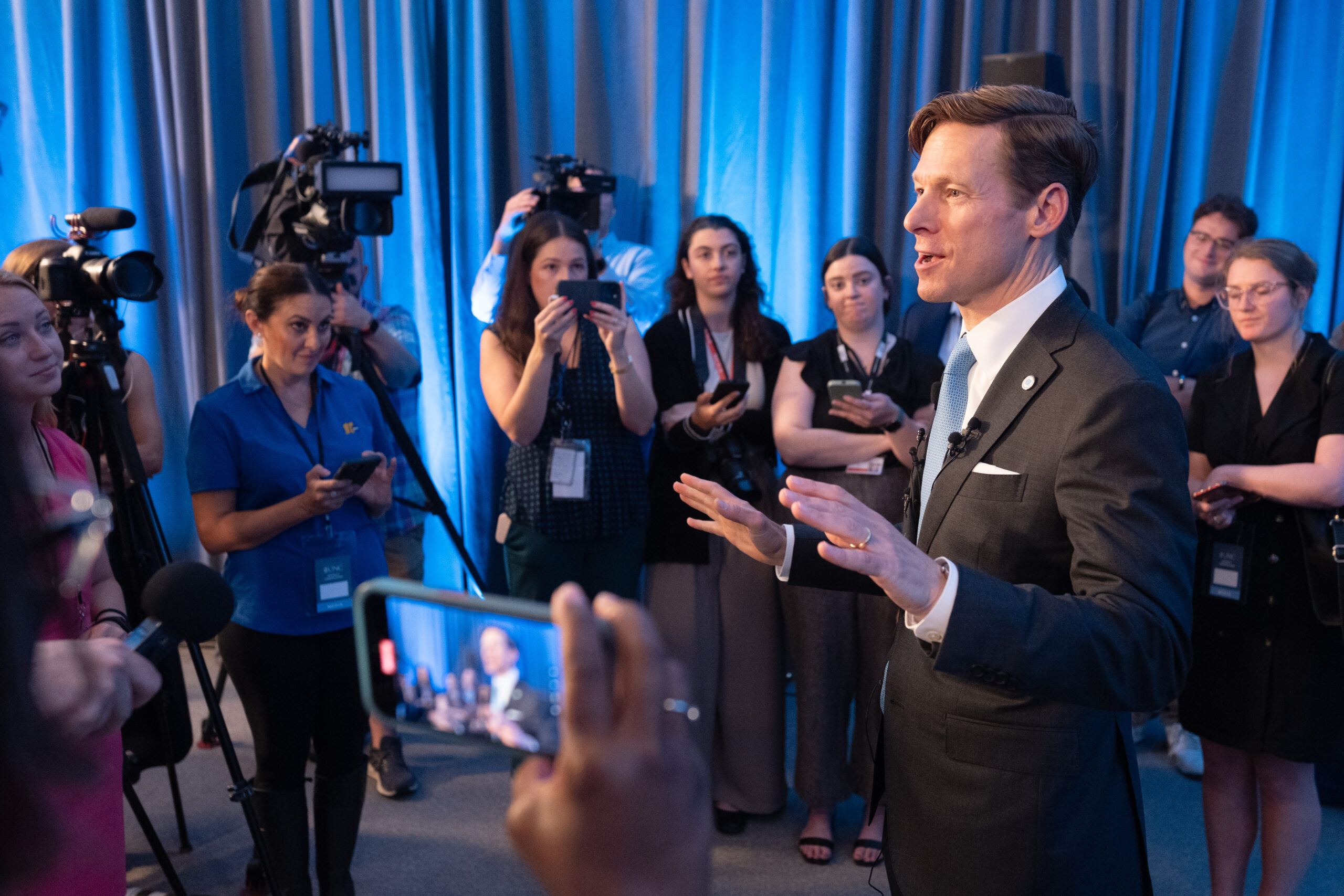
UNC Chancellor Lee H. Roberts answers questions from the media during his Chancellor acceptance event held at the Kenan Center on the campus of the University of North Carolina at Chapel Hill on August 9, 2024. (Photo via Jon Gardiner/UNC-Chapel Hill)
On helping UNC grow and adapt to better reflect North Carolina’s changes, something President Hans stressed in his comments on Friday:
The state is growing very rapidly, as we all know. Carolina has not grown very much. So every year we admit a decreasing percentage of North Carolina’s high school graduates. We enroll a decreasing percentage. We used to be about 5%, now we’re at three and a half percent, 30% drop. If it continues the way it has been, our percentage of North Carolina high school graduates will drop every year. The alternative is to grow — and we recently had the report back from one of our four strategic plan working groups on this issue. How should we grow if we are to grow? What are the implications for our infrastructure, our faculty, our housing, our fitness facilities, dining facilities… things like that. So, we just got the recommendations from the working group on August 1, last week. We’re digesting those now and we’ll move forward to execution and implementation.
On how his passion and love for UNC has developed while leading the university, since he is not an alumni:
It’s a remarkable place. I keep running into people who have been here 20 years, 30 years. The retiring head of the cancer center has been here 55 years. I’m 55 years old, and he’s been on the job 55 years. And I say to people who have been here their whole careers, ‘I’ve been other places, and it’s not like this everywhere.’ This tangible love for the institution, this passion that people have for Carolina, it’s rare and it has to be cherished. It has to be preserved. We’re extremely fortunate to have it. We need to make sure that we’re doing everything we can to enhance it.
On his vision for Carolina Athletics, at a time when college sports are entering a new revenue-sharing model and shifting athletic conferences:
Athletics are obviously crucial to what we do here at Carolina. It’s a core part of our culture. We’re proud of fielding 28 athletics teams. Not too many schools have as many, and there’s a lot of pride in the Tar Heels. We’ve got 12 Tar Heel athletes in Paris competing in the Olympics right now, which is exciting. You’re right: people who have been in college athletics their entire careers have never seen a period of change like this one. By this time next year, we need to know how we’re funding the additional NIL money, the 22 percent. That’s going to require some revenue enhancements, we’ll need to figure out ways to generate more revenue. We’ll probably have to cut some areas of our athletics budget. The good news is: every school in the country who aspires to compete at the top level of DI sports is wrestling with the same challenges right now. So, we don’t have to go through this alone. [There is] a lot of conversation with other ACC presidents and chancellors, AAU presidents and chancellors. I think collectively — over the next year — we’ll be working through that, trying to find the best way forward.
On his relationship and UNC’s partnership with the broader Chapel Hill community, including the local governments:
We take seriously our role as an important citizen here in the Town of Chapel Hill. I’ve tried to spend as much time as I can with Mayor Jess Anderson, [and] exchanged messages with her earlier today. [Town Manager] Chris Blue, I had lunch with him a couple of weeks ago. We have a team, as you know, that spends a lot of time on town-gown relationships. We recently added to that team with Ivy Taylor, the former mayor of San Antonio, who is helping represent the university to the town. So, we look forward to a continued, long, productive, close partnership between the university and the Town of Chapel Hill.
On his priorities as the academic year begins and he assumes the permanent chancellorship:
We’re really excited about the start of the school year. We’ve got 4,700 first-year students showing up in just about a week, excited for the fall. I’m excited for football season, excited to see our field hockey team defend their 11th national championship under our second-year head coach, Erin Matson. We’ve got a bunch of strategic priorities underway… fresh recommendations from our four working groups… getting the School of Civic Life and leadership off the ground… a lot going on with athletics. It’s going to be a terrific semester.
UNC begins its 2024-25 academic year with the first day of classes on Monday, August 19.
Featured photo via Jon Gardiner/UNC-Chapel Hill.
Chapelboro.com does not charge subscription fees, and you can directly support our efforts in local journalism here. Want more of what you see on Chapelboro? Let us bring free local news and community information to you by signing up for our newsletter.

